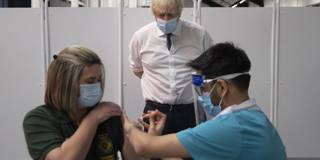During the pandemic, the UK has led the way in studying pharmaceutical interventions, with well-designed randomized controlled studies enabling vast improvements in patient care globally. Yet, by deciding to increase the gap between vaccine doses, the country's government has effectively abandoned this evidence-based approach.
LONDON – The British have often taken great pride in dubious achievements, from the “victorious” retreat from Dunkirk during World War II to the bare-minimum Brexit agreement recently reached with the European Union. The development of a COVID-19 vaccine on British soil, however, was a genuine triumph. And yet, by delaying the delivery of second vaccine doses, the government is set to undercut this feat – and its overall pandemic-containment strategy.

LONDON – The British have often taken great pride in dubious achievements, from the “victorious” retreat from Dunkirk during World War II to the bare-minimum Brexit agreement recently reached with the European Union. The development of a COVID-19 vaccine on British soil, however, was a genuine triumph. And yet, by delaying the delivery of second vaccine doses, the government is set to undercut this feat – and its overall pandemic-containment strategy.